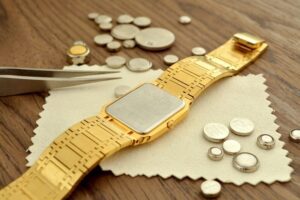7 Reasons Your Watch Is Losing Time
You check the time on your watch to ensure you’re not running late. Perfect. You’re right on schedule. But when you get to your destination, the meeting has already started. Embarrassing!
How does this happen? Turns out, your watch gave you a bum steer, and now you look like the bad guy.
Whether you own a mechanical, quartz, or automatic watch, there are a variety of reasons why your watch could be losing time. Luckily, much of it can be solved with a simple watch repair. Let’s take a look at what could be causing your watch to slow its ticking (and help you avoid more awkward moments in the future).

1. Quartz Watch Battery Problems
This one is the simplest explanation for your watch slowing down—your quartz watch’s battery could run low. Replacing the battery is the first step you should take, but be aware that this is often a job for a watch repair expert. You don’t want to risk damaging your Seiko or Omega quartz watch by replacing the battery on your own, so if you don’t feel up to the task, be sure to reach out to a trusted watch repair company for your Seiko’s battery replacement.
2. Mechanical Watch Components Have Become Magnetized
If you have a mechanical watch, you may have never considered that magnetism might cause it to lose time. Household appliances and other electronics can emit magnetic fields, and if your mechanical watch comes into contact with a magnetic field, the components inside the watch can become magnetized. This causes them to stick together or otherwise move out of their correct position, which in turn messes with the watch’s ability to tell time accurately. If your watch is running too slow (or too fast) and you think magnetized parts might be the cause, consider purchasing a watch degausser. This will demagnetize the inner workings and get your watch back to the correct speed.
3. You’ve Wound Your Mechanical Watch Incorrectly
Did you know there’s a correct way to wind your watch? Most people do it while still wearing the watch, as it seems easy and convenient. The issue is that if you wind your watch while it’s on your wrist, you’re forced to do it at an awkward angle that can stress the winding stem and other components inside the watch. The delicate balance of your watch’s inner parts means that winding your watch at even a slightly off-kilter angle can change your watch’s time-telling speed. To fix this, you’ll need to see a watch repair specialist. To prevent it, make sure you’re winding your watch when it’s off your wrist. This way, you can hold the watch in your hands and ensure everything is kept at the correct angles.
4. You’ve Knocked Your Mechanical Watch
Speaking of delicately balanced parts, here’s another reason your watch may be losing time: the parts can get knocked out of place if you drop your watch or bump it against something too hard. No matter how careful you are with your watch, accidents can happen. If you think a fall or bump might have caused your watch to lose time, you’ll want to take it to a watch repair shop to get all the parts correctly balanced and back in place.
5. You’ve Stopped Wearing Your Automatic Watch
If you own an automatic watch and it’s been a while since you’ve worn it, don’t be surprised if you put it on your wrist to find the time is way off. Automatic watches are self-winding, meaning they require movement to keep everything wound tight. Naturally, a long break from an automatic watch will loosen the winding and cause your watch to lose time. Luckily, it’s a very simple fix—just correct the time and start wearing it again.
6. Exposure to Water
Whether you own an automatic, mechanical, or quartz watch, exposing your watch to water is bad news. Water can damage the parts inside your watch and lead to rust or corrosion. When any component is damaged, your watch will start to run slower and slower. If you think your watch has been exposed to water, you’ll want to get it serviced as soon as possible, since the damage can spread throughout the watch.
7. Extreme Temperature Changes
Here’s a unique reason for your watch losing time that most people never think of. Maybe you’ve accidentally left your watch inside a hot car in the middle of summer, or it’s had prolonged exposure to the freezing winter air. Extreme temperature changes can cause the parts inside your watch to expand or contract, which will move everything around to the point that your watch isn’t able to keep time accurately anymore. Heat can dry up the watch’s lubricant, which causes friction on its gears. Some temperatures and weather can lead to water getting inside the watch as well. If you think a temperature change might be the reason your watch is running slow, be sure to have it checked out by a professional.
Bonus Reason: Your Watch Needs to Be Serviced
Sometimes, there’s no particular reason why your watch is running slow, other than the fact that you haven’t taken it in for maintenance in a while. Servicing your watch will ensure that there’s no unnecessary friction or damage due to worn-out parts or dried-up lubricant.
If it’s been a few years since you’ve taken your watch to a repair shop and it’s losing time, it might just need a simple tune-up. Whether you need a watch battery replacement, extensive damage repair, or a simple servicing, taking your watch to a trusted repair company will keep your watch running smoothly—and keep you on time, too.

